|
|
|
Sort Order |
|
|
|
Items / Page
|
|
|
|
|
|
|
| Srl | Item |
| 1 |
ID:
158695


|
|
|
|
|
| Summary/Abstract |
Chinese “aid” is a lightning rod for criticism. Policy-makers, journalists, and public intellectuals claim that Beijing uses its largesse to cement alliances with political leaders, secure access to natural resources, and create exclusive commercial opportunities for Chinese firms—all at the expense of citizens living in developing countries. We argue that much of the controversy about Chinese “aid” stems from a failure to distinguish between China's Official Development Assistance (ODA) and more commercially oriented sources and types of state financing. Using a new database on China's official financing commitments to Africa from 2000 to 2013, we find that the allocation of Chinese ODA is driven primarily by foreign policy considerations, while economic interests better explain the distribution of less concessional flows. These results highlight the need for better measures of an increasingly diverse set of non-Western financial activities.
|
|
|
|
|
|
|
|
|
|
|
|
|
|
|
|
| 2 |
ID:
158689
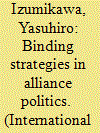

|
|
|
|
|
| Summary/Abstract |
In the mid-1950s, the Soviet Union used a wedge strategy aimed at weaning Japan away from the United States. While the effort failed, this was far from an inevitable outcome. At the time, the Japanese government publicly expressed its intention to improve relations with the communist bloc. Moreover, Moscow offered Tokyo attractive carrots, mainly in the form of a favorable resolution of outstanding territorial disputes. I argue that the failure stemmed from how the United States deployed binding strategies—policies aimed at maintaining or enhancing an ally's loyalty—to counter Moscow's overtures. In doing so, I seek to expand our understanding of binding strategies and the dynamic interplay between binding and wedge strategies. To this end, I present a typology of binding strategies and develop a theory that encompasses dynamic interactions between binding and wedge strategies. I then test the theory with the case of the Soviet-Japanese-US triangular diplomacy and demonstrate that the two strategies are deeply intertwined and should be analyzed as such. I conclude by discussing broader theoretical implications, such as the possibility of developing a dynamic theory of alliance politics.
|
|
|
|
|
|
|
|
|
|
|
|
|
|
|
|
| 3 |
ID:
158697


|
|
|
|
|
| Summary/Abstract |
Scholars and policymakers argue that donors can pursue development goals without bolstering autocratic regimes by bypassing recipient governments and channeling aid through intergovernmental and nongovernmental organizations. However, I argue that bypass aid can subsidize government transfers to citizens and thus reduce popular resistance to autocrats. By providing goods and services that benefit individuals under the status quo, bypass aid may affect citizens’ willingness to challenge an incumbent regime. In particular, aid may lower the concessions that an autocrat needs to make to, on the one hand, deter unrest or, on the other hand, increase the opportunity costs of political resistance. As such, aid may have political effects regardless of whether or not recipient governments have managerial control over aid. Statistical tests show that bypass aid is associated with less frequent domestic unrest in autocracies. To address potential endogeneity, I use an original data set that records instances in which governments are suspected of, or actually caught, misusing aid to proxy for the distribution of aid across channels.
|
|
|
|
|
|
|
|
|
|
|
|
|
|
|
|
| 4 |
ID:
158688
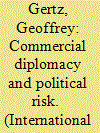

|
|
|
|
|
| Summary/Abstract |
The modern investor-state arbitration regime was explicitly designed to replace commercial diplomacy as a mechanism for protecting foreign investment. I argue, however, that diplomacy continues to play an important role in managing political risk, particularly in countries with weak rule of law. Yet, since commercial diplomacy occurs primarily behind closed doors, it is difficult to observe, let alone test for its effects. To overcome this obstacle, I exploit variation in vacancies among US ambassadors to foreign countries—conditions overwhelmingly driven by US domestic political factors—which provides for a quasi-natural experiment for testing the effects of commercial diplomacy. I show that American firms operating abroad are significantly more likely to initiate investor-state arbitration disputes during temporary vacancies in US ambassadorships. The effects of these vacancies prove particularly strong in countries with weak rule of law. The results suggest American investors frequently seek assistance from the US government in informally resolving incipient investment disputes; if diplomatic channels are unsuccessful or unavailable, investors then file formal arbitration cases. These findings underline that, even in highly legalized issue areas in world politics, such as investment protection, informal diplomacy continues to influence important political economy outcomes.
|
|
|
|
|
|
|
|
|
|
|
|
|
|
|
|
| 5 |
ID:
158694
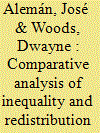

|
|
|
|
|
| Summary/Abstract |
What is the relationship between income inequality and redistributive policies? This question carries with it important implications for both scholars of comparative politics and for core political dynamics in contemporary world politics. We contend that the current literature fails to provide satisfactory answers. It generally does not acknowledge heterogeneity in the relationship between inequality and redistributive policies across space and time, nor does it use cross-nationally comparable data on government redistribution and income. In this note, we compare the relationship between inequality and redistribution over time, as well as among clusters of developed and less developed countries. We use a number of statistical models to address the complexity of the relationship. We find a positive, short-term association between inequality and redistribution, controlling for endogeneity between redistribution and market income inequality. We also find that, over the long term, inequality increases redistribution in developed democracies, but appears to decrease it in a number of developing nations.
|
|
|
|
|
|
|
|
|
|
|
|
|
|
|
|
| 6 |
ID:
158693


|
|
|
|
|
| Summary/Abstract |
The developing world currently loses more money via capital flight than it receives through foreign aid and foreign direct investment combined. This "leakage" of capital produces many pernicious consequences for developing economies. What factors influence capital flight? I argue that it follows an electoral cycle. Greater uncertainty prior to elections incentivizes those in the business sector to take their money elsewhere. Using data from thirty-six African countries from 1971 to 2009, I find support for my argument: capital flight is higher during election years than it is otherwise.
|
|
|
|
|
|
|
|
|
|
|
|
|
|
|
|
| 7 |
ID:
158683


|
|
|
|
|
| Summary/Abstract |
Recent events in international finance illustrate the close connection between the viability of a country's major private financial institutions and the sustainability of its sovereign debt. We explore the precise nature of this connection and the ways in which it shapes investors’ expectations of sovereign creditworthiness. We consider how investors use the overall level of information available about the private financial sector—and the potential risks it poses to government finances—when making decisions about investing in sovereign debt. We expect that governments providing more information about the private financial sector will have lower, and less volatile, borrowing costs. In order to test this argument, we create a new Financial Data Transparency (FDT) Index measuring governments’ willingness to release credible financial system data. Using the FDT and a sample of high-income OECD countries, we find that such transparency reduces sovereign borrowing costs. The effects are conditional on the level of public indebtedness. Transparent countries with low debt enjoy lower and less volatile borrowing costs.
|
|
|
|
|
|
|
|
|
|
|
|
|
|
|
|
| 8 |
ID:
158685


|
|
|
|
|
| Summary/Abstract |
This note analyzes the effectiveness of leadership targeting in deterring militant operations. It broadens how we think about their deterrence effects by including nontargeted groups. I argue that leadership decapitation of one group signals to other would-be aggressors a state's capability and determination to deploy such actions against them. Nontargeted groups are thus forced to recalculate the cost-benefit balance of conducting further attacks, which leads to indirect deterrence. Using the Global Terrorism Database from 1970 to 2008 and Price's (2012) leadership decapitation data, targeted capturing is found to deter operations by nontargeted groups, and this effect is magnified when those militants form an alliance. While targeted killing is frequently executed through drone strikes, incurring lower costs and risk for the state, the findings indicate that killing a leader does not reduce militant operations. Policymakers should recognize the unintended effect deriving from one leadership decapitation and transform it into an intended outcome to maximize their expected payoffs.
|
|
|
|
|
|
|
|
|
|
|
|
|
|
|
|
| 9 |
ID:
158680


|
|
|
|
|
| Summary/Abstract |
International-relations scholars tend to focus on the formation, design, and effects of international organizations (IOs). However, the vitality of IOs varies tremendously. I argue that IOs end up in one of three situations. They could die off altogether, though this happens infrequently. More commonly, many IOs become “zombies.” They continue to operate, but without any progress toward their mandates. A third category includes IOs that are alive and functioning. I develop a theory to explain an organization's vitality, hinging on the quality of the bureaucracy. In an environment where IOs with similar goals, and with many overlapping members, compete for bureaucrats, the ability of the secretariats to attract talented staff and to enact policy autonomously are associated with whether organizations truly stay active, simply endure, or die off. I demonstrate this proposition using a new measure of the vitality of international economic organizations from 1950 to the present. Around 52 percent of the organizations in the sample are alive and functioning, around 10 percent are essentially dead, and nearly 38 percent are zombies. Using these original data, tests of these propositions support the theory.
|
|
|
|
|
|
|
|
|
|
|
|
|
|
|
|
| 10 |
ID:
158690
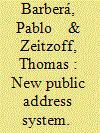

|
|
|
|
|
| Summary/Abstract |
The growth of social media—and, in particular, Twitter and Facebook—has led scholars to study its effects on mass behavior and protest. But leaders are also active on social media. They use their accounts to communicate with domestic and international audiences. By the end of 2014, more than 76 percent of world leaders had an active presence on social media. What explains variation in their adoption and use of social media? We look at several different potential hypotheses: higher income per capita and internet penetration (modernization), social pressure, level of democratization, and geographic spread of adoption (diffusion). We find strong support that (1) increased political pressure from social unrest and (2) higher levels of democratization correlate with leader adoption of social media platforms. Although our findings are correlational, they reveal that institutional and political pressures are related to social media adoption and the political communication of world leaders.
|
|
|
|
|
|
|
|
|
|
|
|
|
|
|
|
| 11 |
ID:
158682


|
|
|
|
|
| Summary/Abstract |
Many international organizations reduce the costs states incur from conflict. Critics argue that the expectation of such aid, by mitigating potential suffering, perversely incentivizes states to initiate conflict more often. I develop a model that formalizes this intuition. It shows that institutions may still ameliorate suffering in two ways. First, they may absorb so many of the expected costs that they compensate for the fact that conflicts occur more often. Second, aid can have a second-order effect of reducing uncertainty about the costs of conflict; to the extent that this uncertainty explains why parties cannot negotiate a cooperative alternative, aid might actually reduce the incentive to initiate conflict. Whether aid ultimately helps or hurts therefore depends on how it interacts with the informational challenges states face.
|
|
|
|
|
|
|
|
|
|
|
|
|
|
|
|
| 12 |
ID:
158687


|
|
|
|
|
| Summary/Abstract |
This article introduces the concept of protean power as the basis for a better analysis of unanticipated events in world politics. Protean power is the effect of actors’ agility as they adapt in situations of uncertainty. This definition departs from conventional definitions of power, which focus on actors’ evolving ability to exercise control in situations of calculable risk and their consequent ability to cause outcomes these actors deem desirable. We argue that this conventional view is overly confining; inclusion of protean power in our analytical models helps us to better account for unexpected change in world politics. Notably, actors respond to shifts between risk and uncertainty, in both context and experience, with affirmation, refusal, improvisation, or innovation. In doing so, they create room for control and protean power as effects, rather than causes, of such practices. However, protean power should not replace control power. These two basic forms of power relate to one another, in a variety of ways, in complex contexts characterized by both risk and uncertainty.
|
|
|
|
|
|
|
|
|
|
|
|
|
|
|
|
| 13 |
ID:
158692
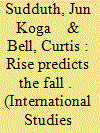

|
|
|
|
|
| Summary/Abstract |
How does the way a nondemocratic leader takes power affect the stability of their government? Prior research argues that irregular leader entries—those that violate the regime's norms for leader selection—are especially likely to foreshadow subsequent unconstitutional transitions. This article contends that some forms of irregular leader entry can actually protect leaders from subsequently being forcibly removed from office. When leaders use a strong and loyal coalition of supporters to overthrow not only their predecessors, but their entire ruling regimes, they demonstrate their strength to any potential rivals. Thus, leaders that gain power through, for example, successful rebellions, popular uprisings, and major regime-changing coups, deter subsequent challenges. They are substantially less likely to be ousted than leaders who take power in ways—such as via normal succession or reshuffling among ruling elites—that do not convey strength so convincingly. We assess our claims by analyzing an original dataset of nondemocratic leader transitions. We show that accounting for the strength demonstrated during a leader's entry to power substantially improves our ability to predict how, and when, that leader will eventually leave office.
|
|
|
|
|
|
|
|
|
|
|
|
|
|
|
|
| 14 |
ID:
158691
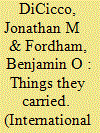

|
|
|
|
|
| Summary/Abstract |
Do foreign policy elites who shared formative political experiences also share similar views on subsequent policy issues? Proponents of a generation effect suggest that they do, but this argument overlooks two facts: (1) not everyone experiences major historical events in the same way and (2) different experiences might give rise to quite different policy views. Here we investigate the impact of the Vietnam War on elite opinion about foreign policy during the following two decades using elite surveys conducted by the Foreign Policy Leadership Project (FPLP) from 1976 through 1996, assessing their susceptibility to what has been called the Vietnam Syndrome. Not surprisingly, we find that age and military service influenced elite opinion about the Vietnam War. More importantly, we find that different trajectories of opinion about the Vietnam War influenced later views about a wide range of foreign policy issues during the Cold War, even after controlling for party identification and ideology. However, we see little evidence that these effects persisted after the end of the Cold War. This finding holds even on matters like civil war intervention, for which we might expect the experience of the Vietnam War to remain relevant. Our analysis suggests that the Vietnam Syndrome is restricted to matters involving Cold War rivalry.
|
|
|
|
|
|
|
|
|
|
|
|
|
|
|
|
| 15 |
ID:
158686


|
|
|
|
|
| Summary/Abstract |
What is time? And why does it matter to international politics? Despite evidence that time is central to political life, international-relations theories often take it for granted. Important efforts to address such oversights critique influential disciplinary assumptions and expand our perspective on temporal experience. But they do not substantially deepen our understanding of time, let alone its relationship to politics. International-relations theory retains entrenched habits of thinking and speaking about time that isolate inquiry, constrain dialogue, and reify time as a stand-alone object detached from social relations and processes. This theory note therefore reconstructs international relations’ temporal imagination. Instead of relying on pre-existing, static concepts of time, it develops a framework from the basic activity of timing: practical efforts to establish relationships between various changes according to a standard that enables orientation, direction, and control. Timing theory explains the political origins of time and the power of our most familiar ideas about it. It also resolves key problems attending other temporal research. Finally, it offers scholars more dynamic ways to analyze the temporal politics of important phenomena like war and identity. It thus highlights how, in both practice and theory, international politics is very much a matter of timing.
|
|
|
|
|
|
|
|
|
|
|
|
|
|
|
|
| 16 |
ID:
158696


|
|
|
|
|
| Summary/Abstract |
How do the human rights practices abroad affect decisions about the allocation of foreign aid? This article provides a new approach to this long-standing question. We bring donor government, donor citizens, and recipients’ attributes together in a single analytical framework. We argue that donor citizens are more self-serving than previously assumed; they do not wholeheartedly support their government punishing human rights abusers when those states provide important policy benefits. When donor governments believe that their citizens will hold them accountable for their policy choices, they make foreign aid decisions that mirror citizens’ self-serving policy preferences. Thus, they avoid punishing repressive regimes that are the sources of valuable benefits. Our experimental and observational results provide support for our claims. Overall, our findings suggest that aid donors selectively punish human rights violators with aid cuts, but their variegated treatment of human rights violators largely stems from the self-serving policy preferences of their voters.
|
|
|
|
|
|
|
|
|
|
|
|
|
|
|
|
| 17 |
ID:
158684


|
|
|
|
|
| Summary/Abstract |
Previous research suggests that first-strike advantages can create commitment problems that lead rational leaders to opt for war, even when both sides are perfectly informed. In this article, we develop a formal model that extends upon this work. We include a more detailed account of war processes in order to determine what factors are most likely to cause first-strike advantages that lead to war. In particular, we decompose first-strike advantages into three underlying dimensions: tactical offensive advantages, mobilization advantages, and the destructiveness of an initial attack. Our model also allows states to counterattack, rather than, as typical in the literature, assume a single-stage conflict. By studying the interaction of these factors, we uncover surprising results about wars produced by first-strike advantages. First, offensive advantages can lead to war in the absence of mobilization advantages. However, they only do so when successful attacks can destroy an extremely large proportion of the enemy's military power. In contrast, mobilization advantages always increase the likelihood of war. Surprisingly, mobilization advantages are particularly likely to lead to war when combined with defensive advantages. We demonstrate that these mechanisms can explain war initiation through an examination of the 1967 and 1973 Arab-Israeli Wars.
|
|
|
|
|
|
|
|
|
|
|
|
|
|
|
|
|
|
|
|
|